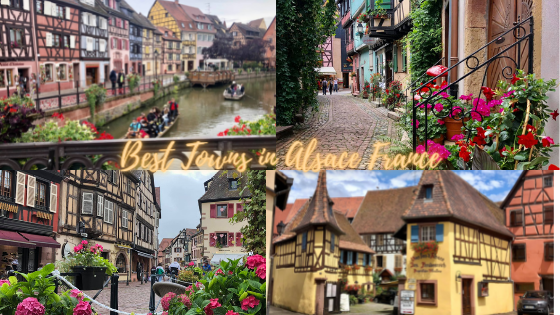
Best Towns in Alsace France
I discovered the Alsace region of France a couple of weeks ago for the first time! Wow, it was so beautiful! I want to share my experience and what I believe are the best towns in Alsace France! I will also tell you about a couple of other places we visited. I can’t believe I have never visited this magical area since moving to Europe in 1993. Alsace was only a 2.5-hour drive from my home in Switzerland.
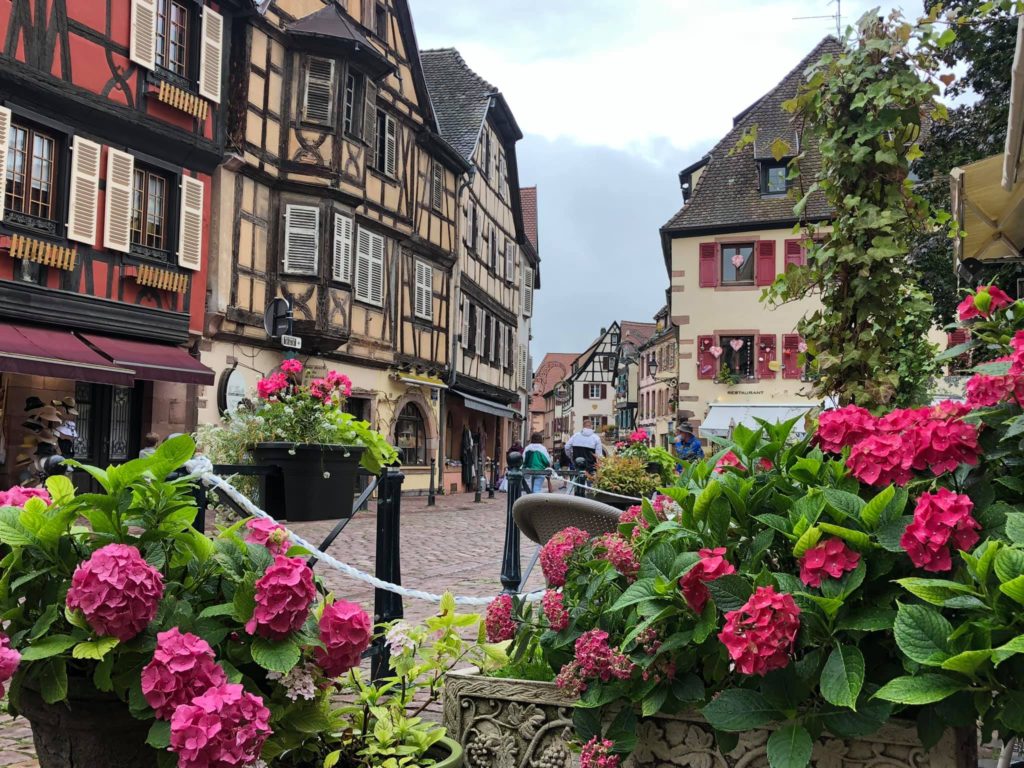
Colmar
My friend and I decided to base ourselves in the larger town of Colmar for the three nights. I found a nice two-bedroom apartment on Airbnb. It was located in the center of town and also provided a locked courtyard for our car. We did day trips from here to visit the smaller medieval towns as well as Strasbourg.
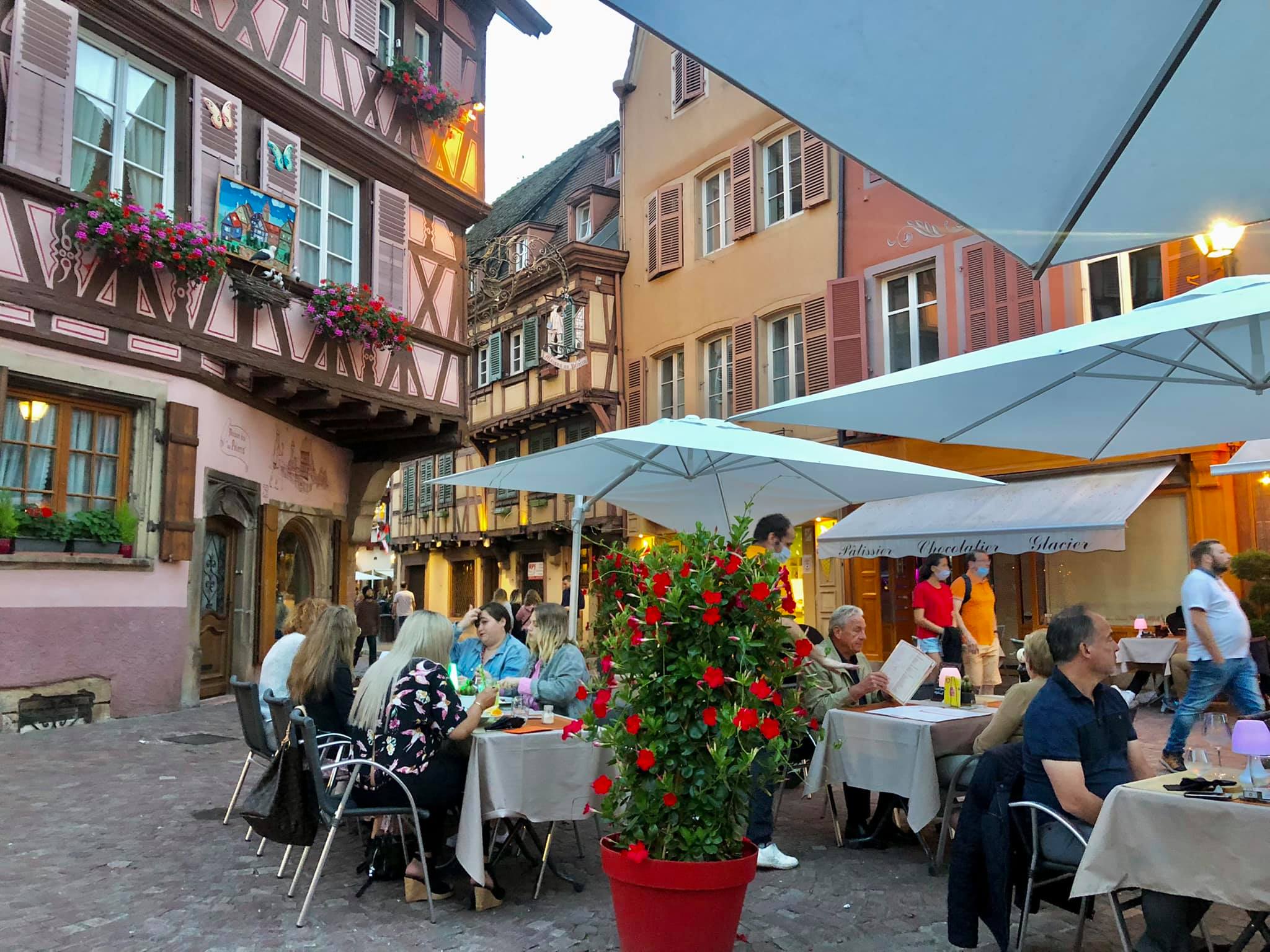
After each day trip, we would park our car at our apartment and then walk around Colmar to find a dinner restaurant. Most of the restaurants provided outdoor dining and you didn’t need a reservation.
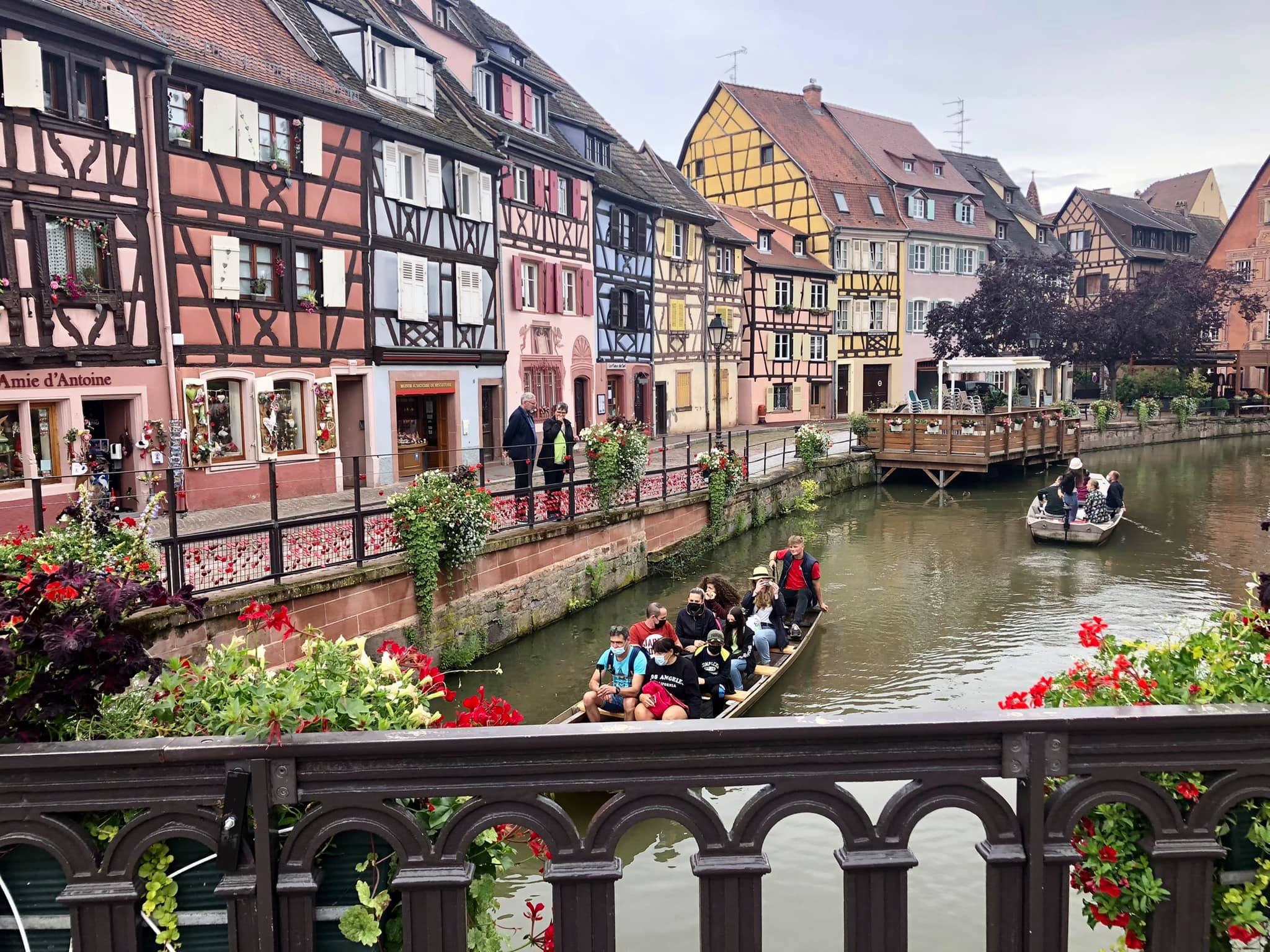
One of the coolest areas of Colmar is called Little Venise. It was something out of a fairytale book! Little Venise is filled with colorful buildings, abundant flowers, and a scenic river.
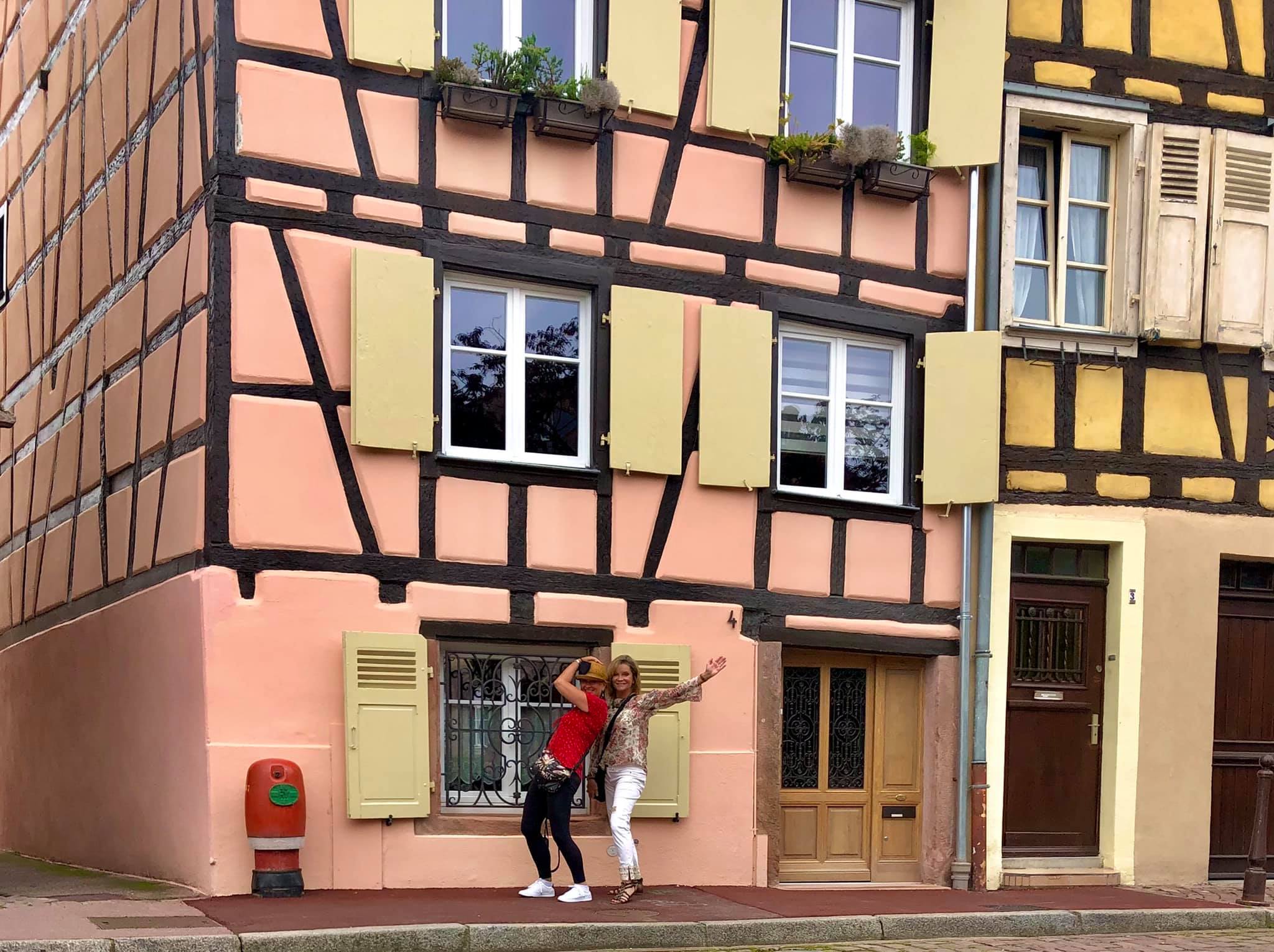
We were able to hop on one of the boats for a 30-minute tour up and down the river. I highly recommend doing this as you get a different kind of view from the water and will also hear about the history.
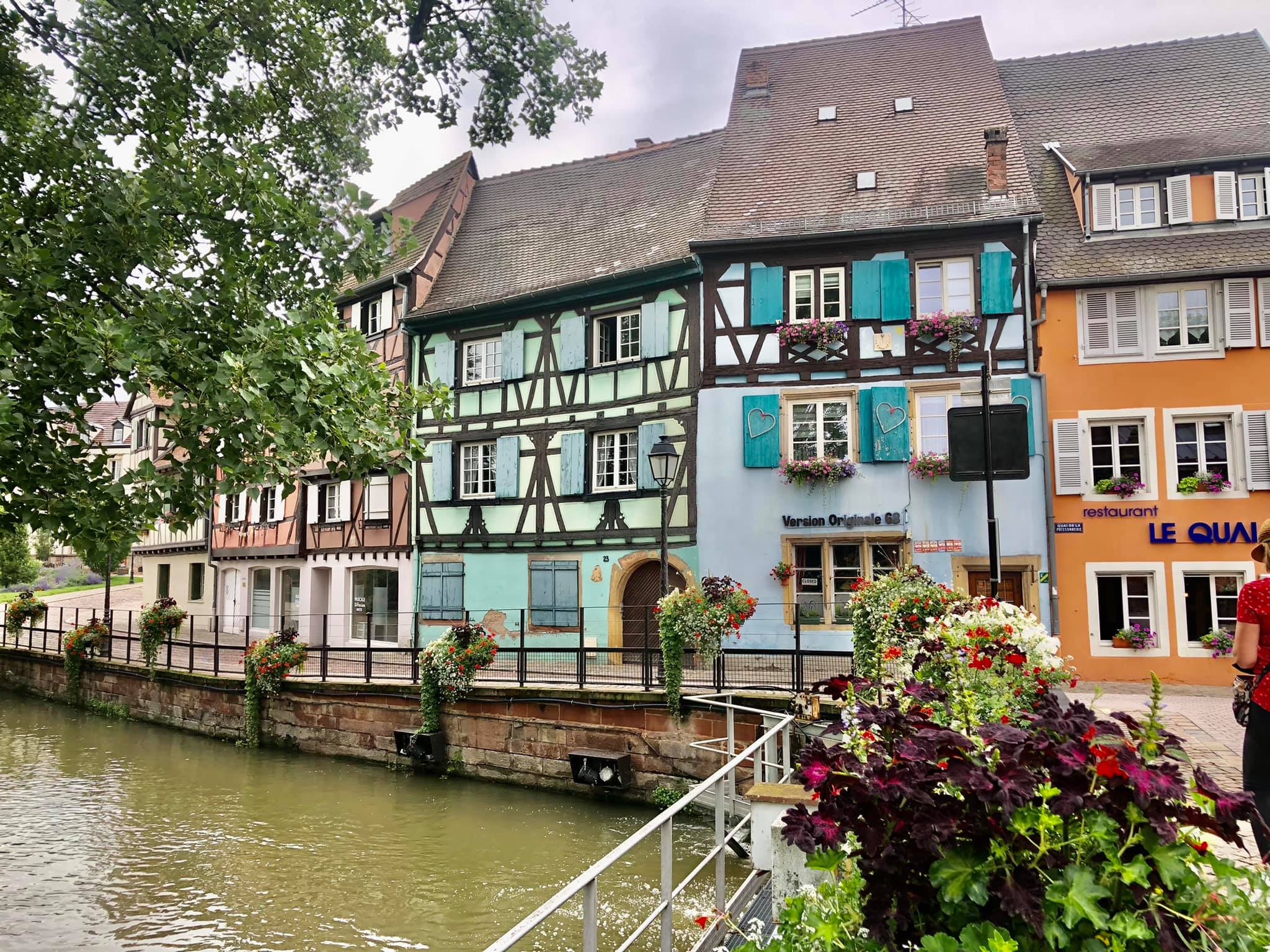
Ribeauvillé
The first town we visited was Ribeauvillé which is halfway between Strasbourg and Mulhouse and has a population of 5000. This village is unique because high above it you will see three castles, called the ‘Three Castles of the Lords of Ribeaupierre’. You cannot reach the castles by car but only on foot. We were not up to a steep hike that day, so we just admired the view from town.
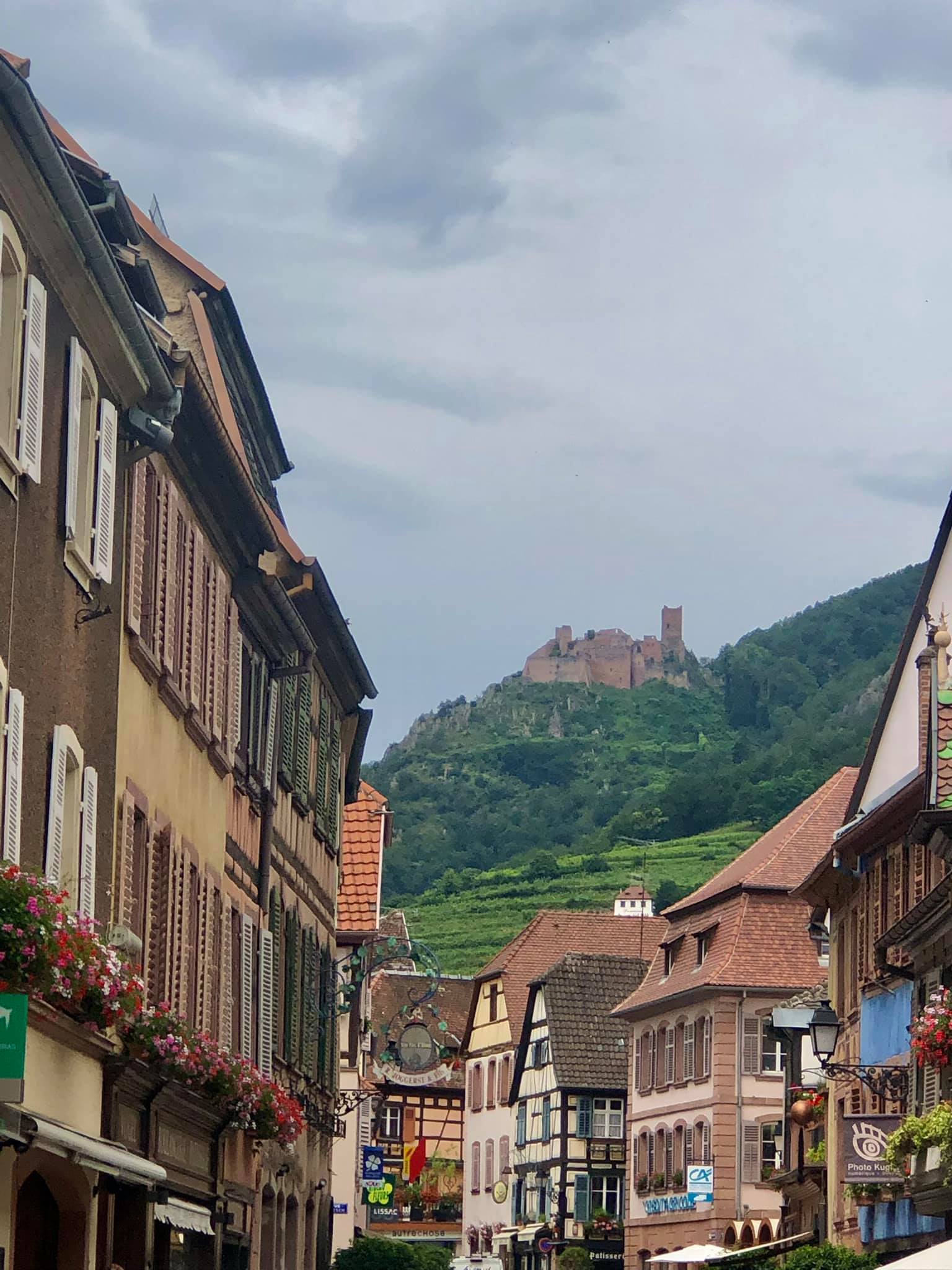
There is one main street and a few side streets with buildings dating back to the 15th to 18th century. We loved this town except for the cars that were allowed on the streets and parked all along the side. It just took away from the ambiance and was a nuisance for those trying to stroll quietly through the town.
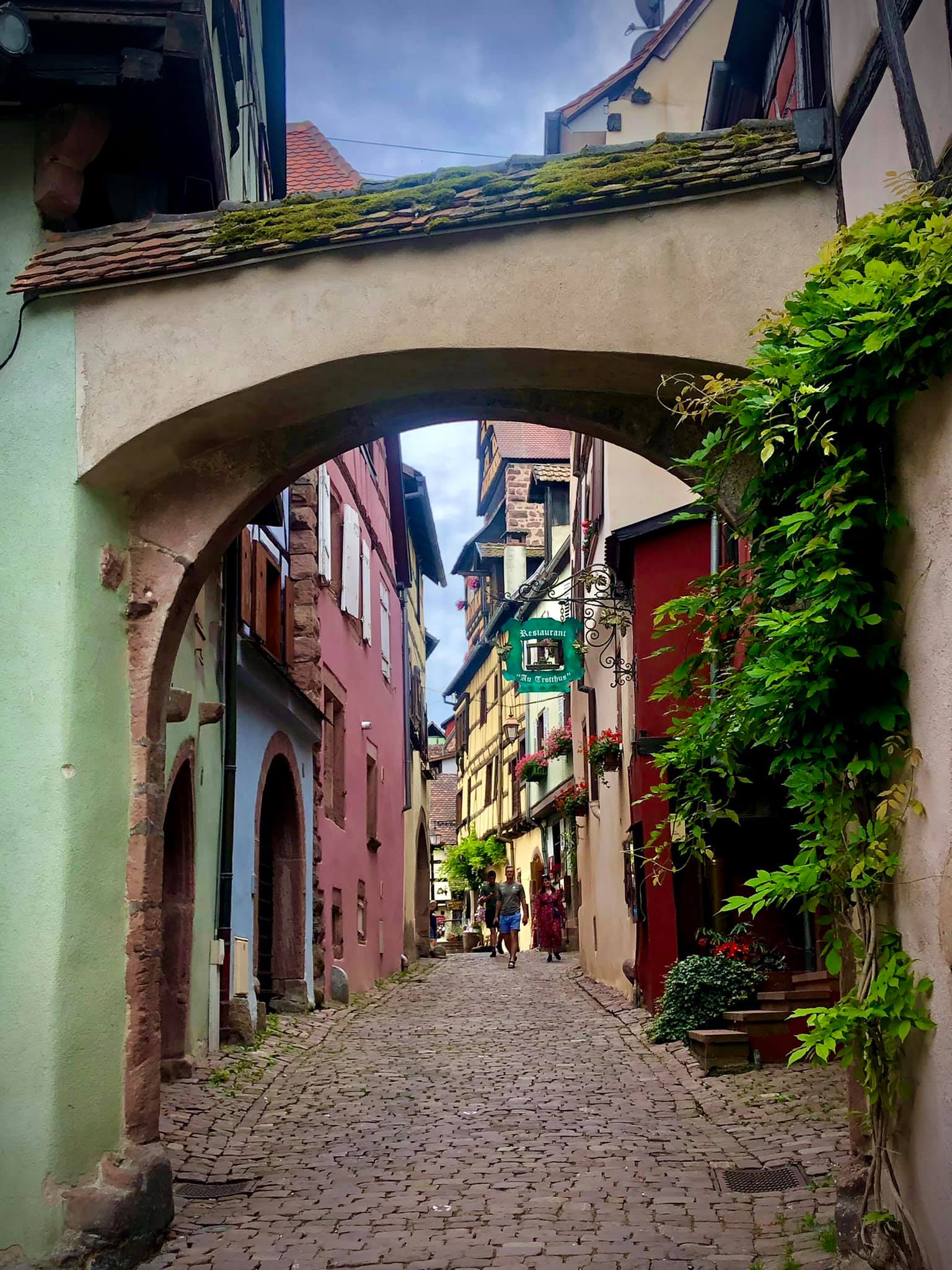
Riquewihr
I have to say this village was one of my favorites. For starters, there were no cars and we could easily walk through the pedestrian streets.
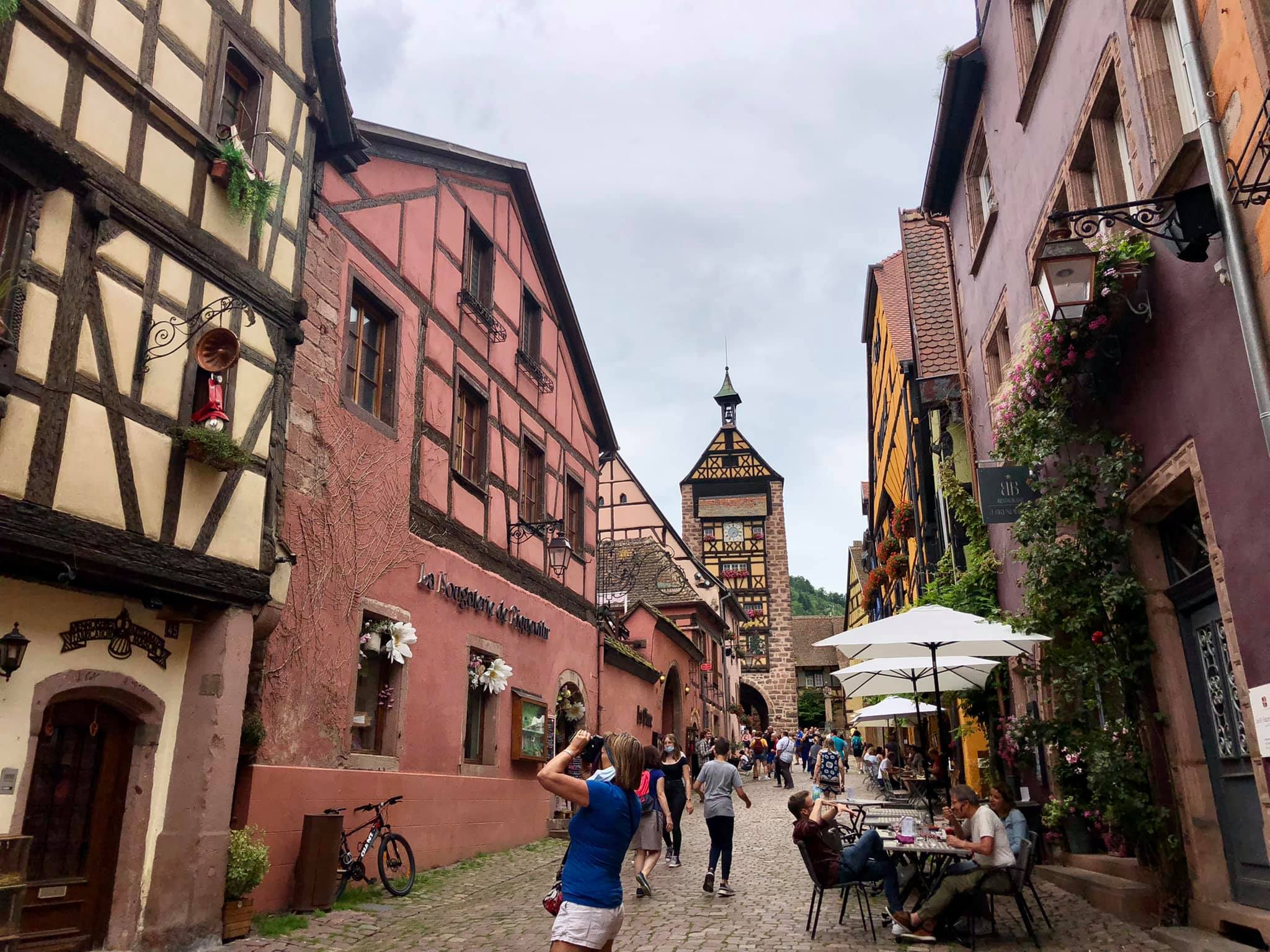
The half-timbered buildings were similar to Ribeauville. What are half-timbered buildings? Half-timbering is a way of constructing wood-frame structures with the structural timbers exposed. This medieval method of construction is called timber framing. The wooden wall framing of studs, crossbeams, and braces are exposed to the outside, and the spaces between the wooden timbers are filled with plaster, brick, or stone. This building method was common in the 16th century and is still used for decorative purposes.
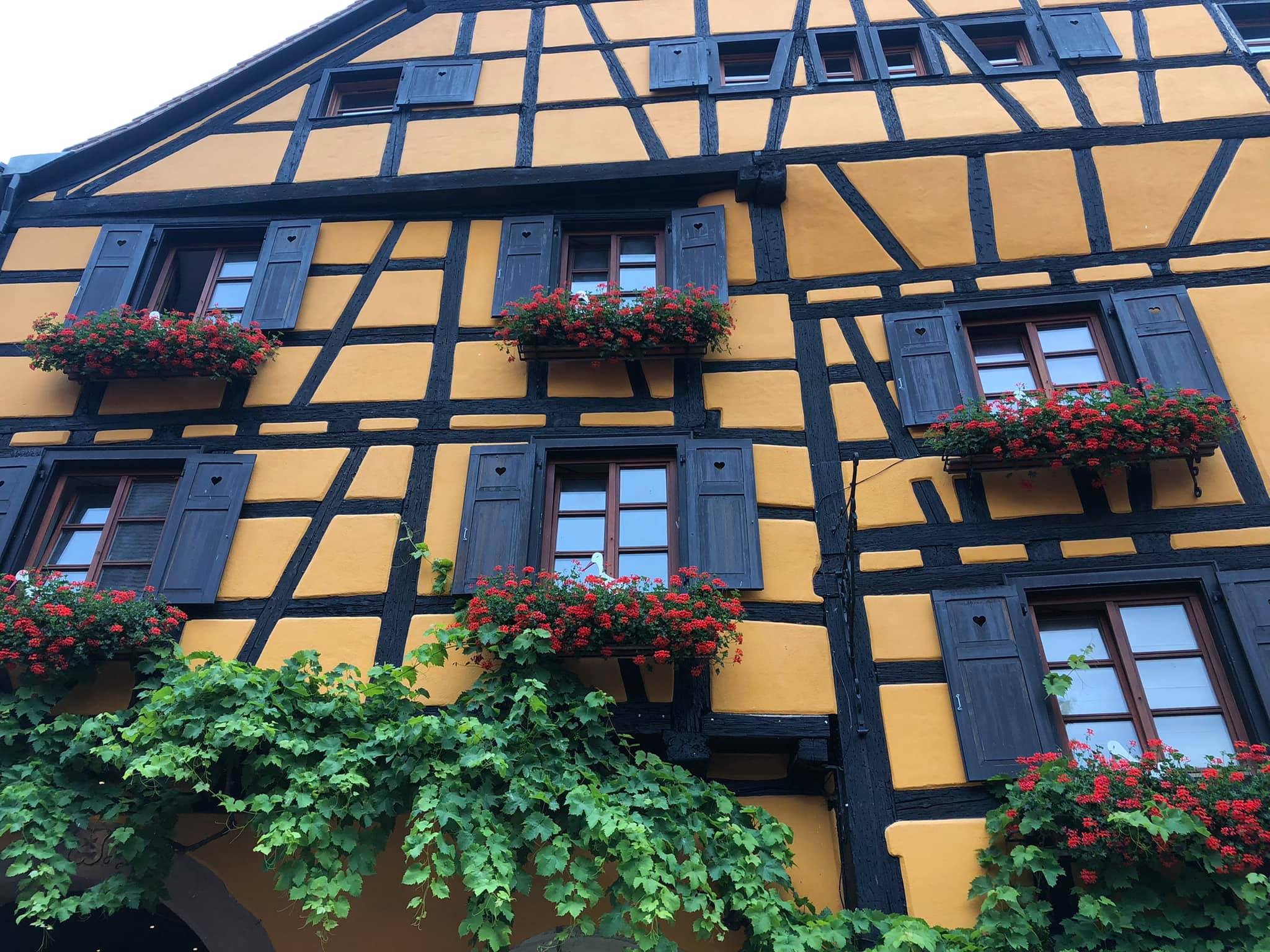
There was a huge clock tower in the center of the village. We found more tourists in this town but it wasn’t too bad for mid-July. As in many of the Alsace towns, you will see green vineyards surrounding the village and built up on hillsides. The wines of Alsace are very popular and you must try them!
Butterfly Gardens in Hunawihr
On the second day of our trip, we had rain in the morning. We chose to stay dry and visit the indoor butterfly gardens located near Ribeauvillé. In French, the place is called Jardins des Papillons.

The entrance fee was 8 euros which included some other exhibitions to visit near the gardens. You can walk around and watch the many varieties of butterflies flying freely. They also had plates of fruit sitting out where the butterflies would perch themselves to eat. This was the best way to get a close-up look as they stayed still and didn’t fly away.
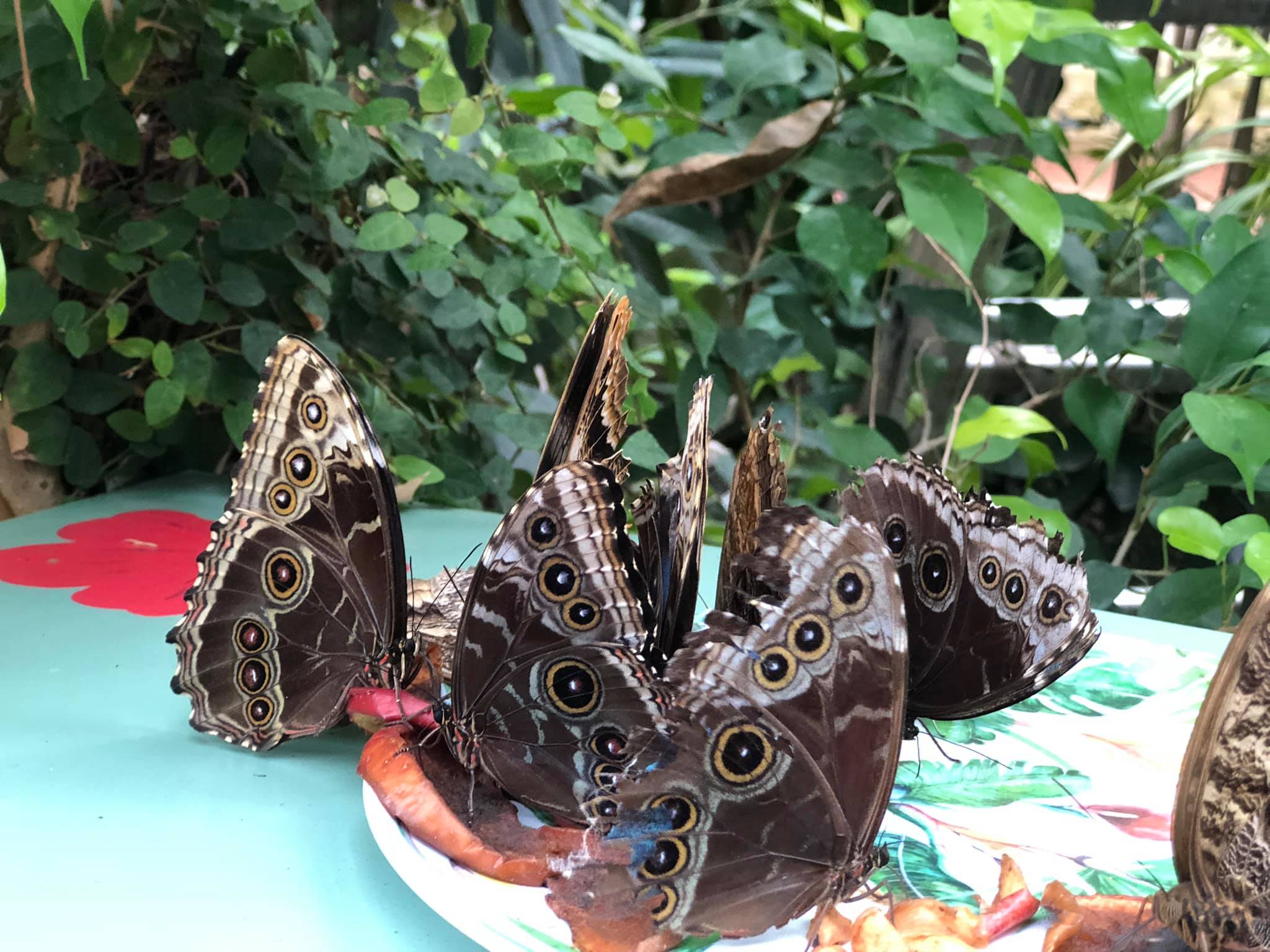
My friend and I love to practice our photography skills, so this activity kept us well entertained for almost two hours. If you love butterflies, you will enjoy this activity in Alsace.
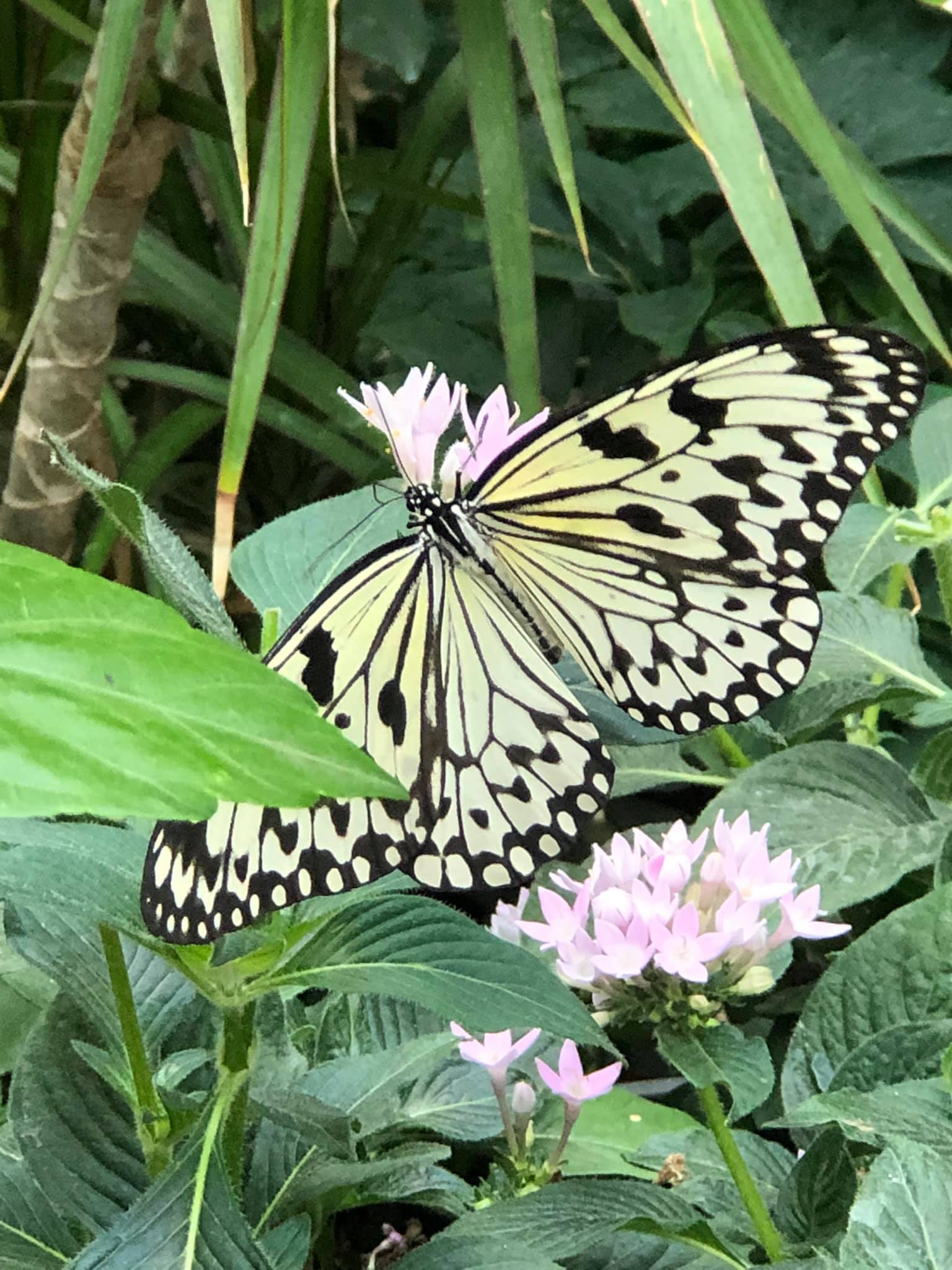
Kaysersberg
On our second day, we went to Kaysersberg after seeing the butterfly gardens. What made this village different from the others was the river running through it. There were ancient stone bridges and restaurants with terraces overlooking the water.
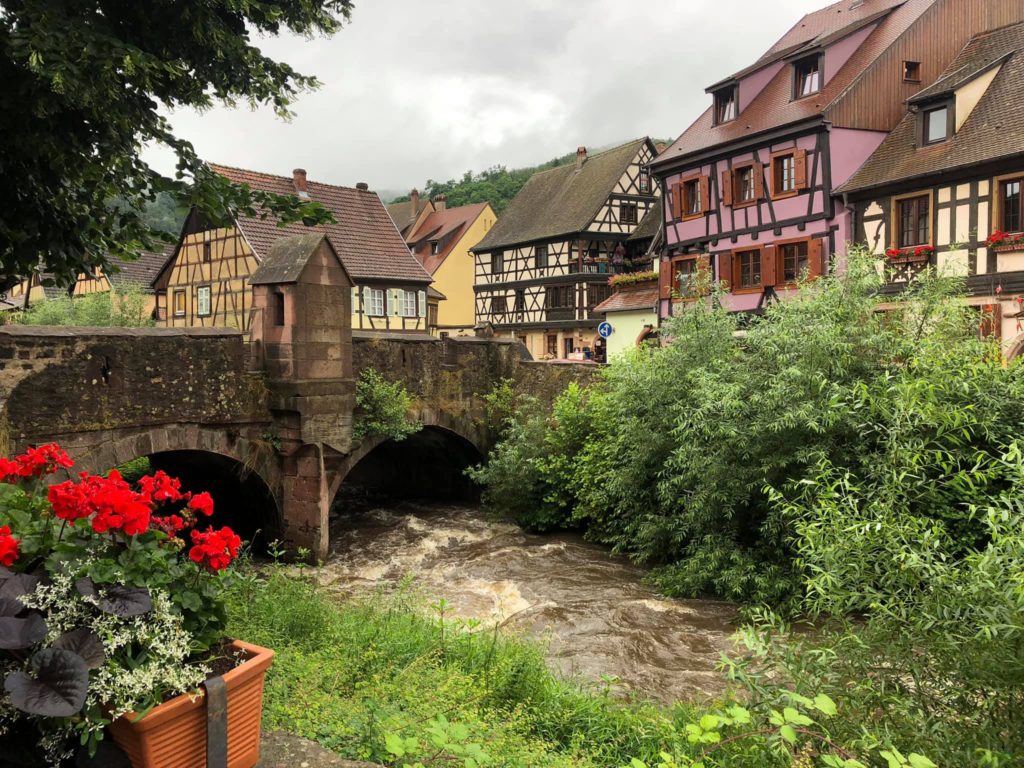
We learned the hard way that restaurants stop serving lunch around 2:30 pm. We waited too long to eat and were being turned away by all the restaurants. We finally found a place that served a few dishes.
I had the typical flammekueche (Tarte flambée) and my friend tried the baeckeoffe (means “baker’s oven”). The flammekueche is similar to a thin pizza but without tomato sauce. It is normally cooked with white cream, onions, and strips of bacon. I found it to be quite tasty!
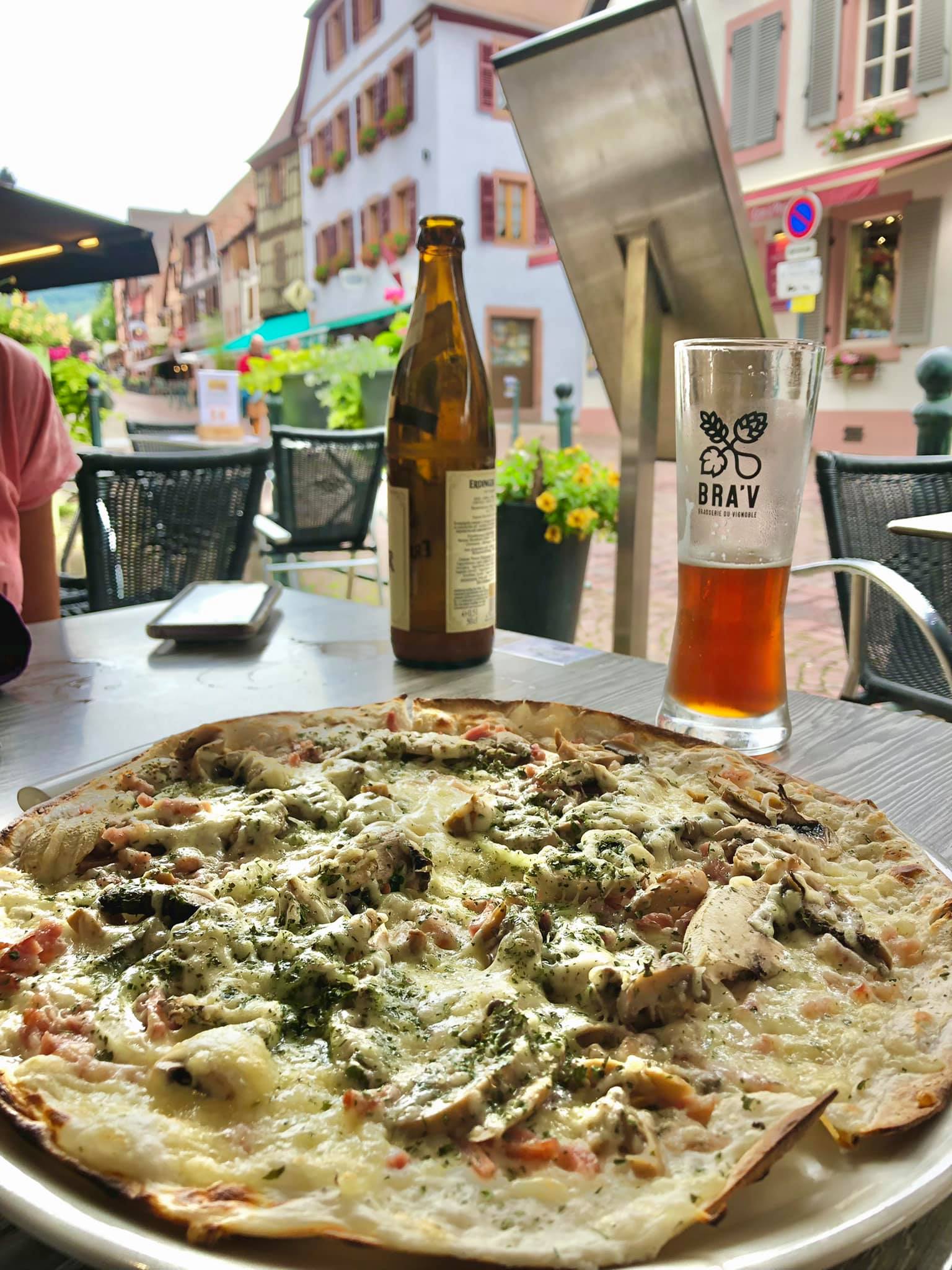
The baeckeoffe is a mix of sliced potatoes, onions, and many different types of meat. It is often marinated in Alsatian white wine and berries and then slow-cooked in a ceramic casserole dish. My friend enjoyed eating this typical dish from Alsace.
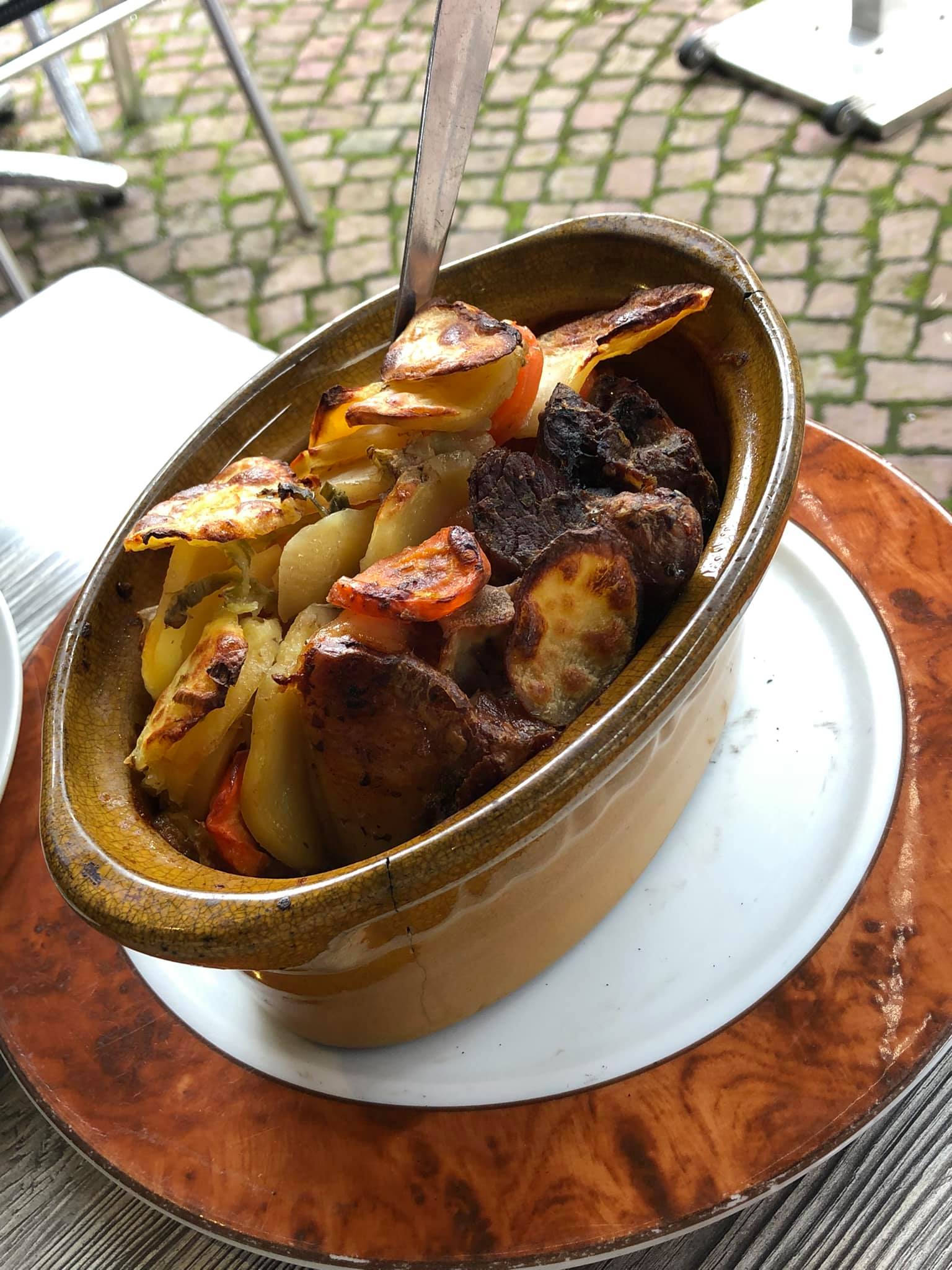
We liked the small boutiques and shops in Kaysersberg. I bought a ceramic souvenir dish to hold my deviled eggs. There were many side streets around the river to explore.
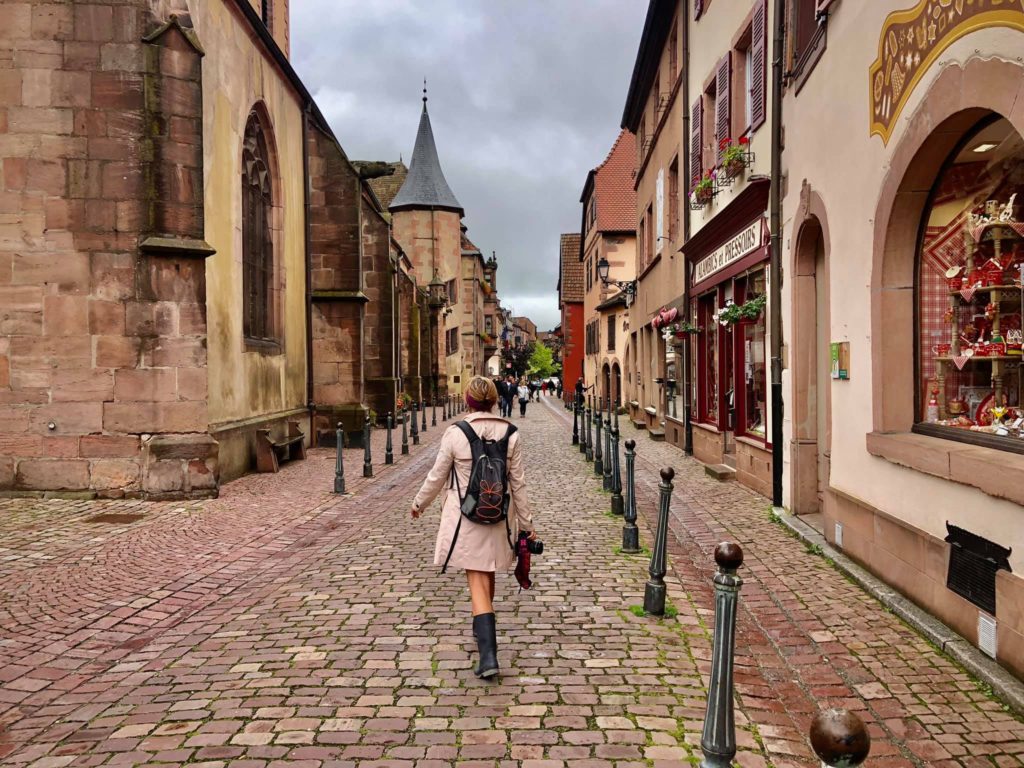
Château du Haut-Koenigsbourg
After visiting Kaysersberg, we still had time to squeeze in a drive to the beautiful Château du Haut-Koenigsbourg. This castle was built in the 12th century and was a place of European conflicts and rivalry between lords, kings and emperors.
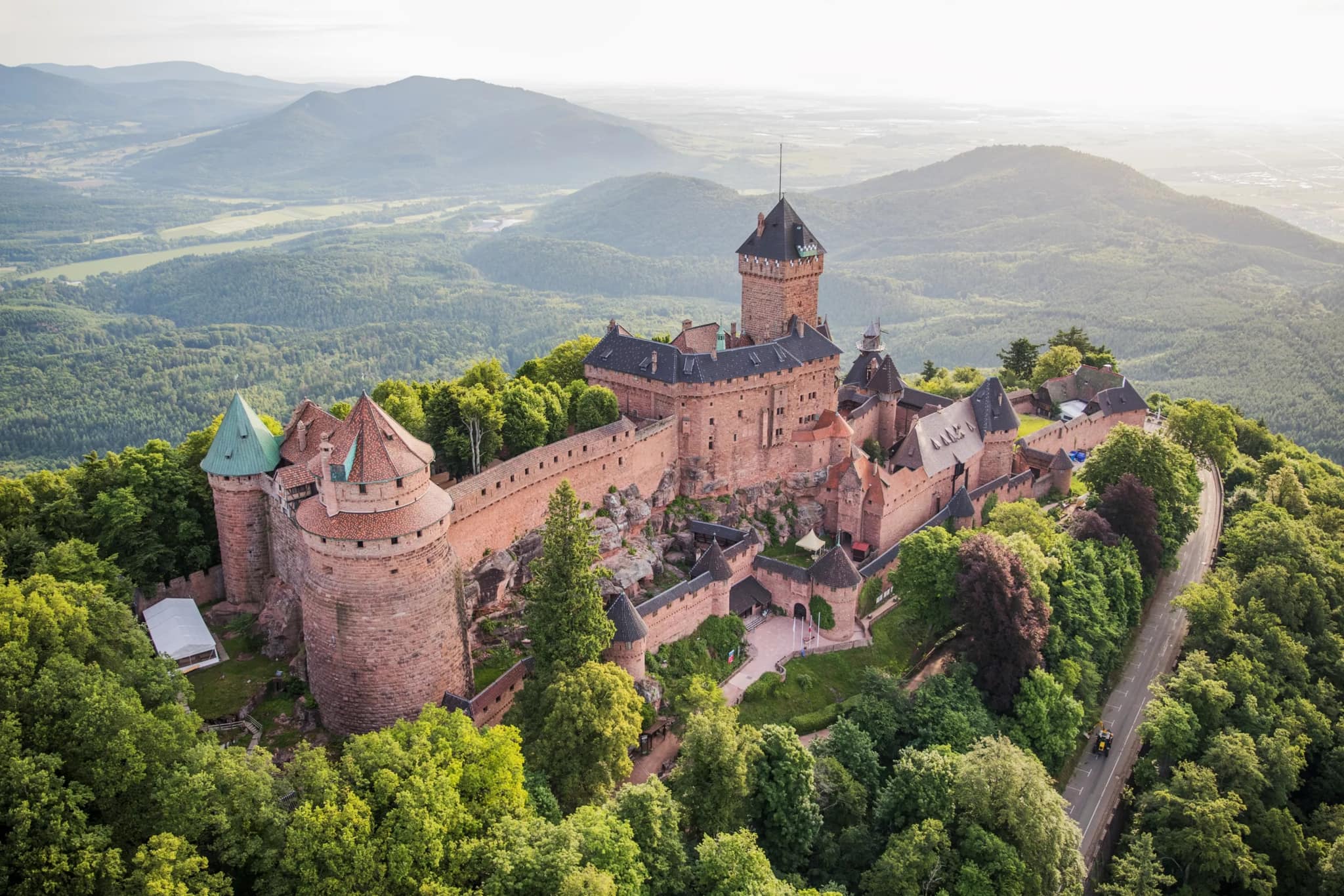
When we arrived at the castle, they were just closing but we still enjoyed walking around the outside of the castle and seeing the views overlooking the Alsace vineyards and towns.
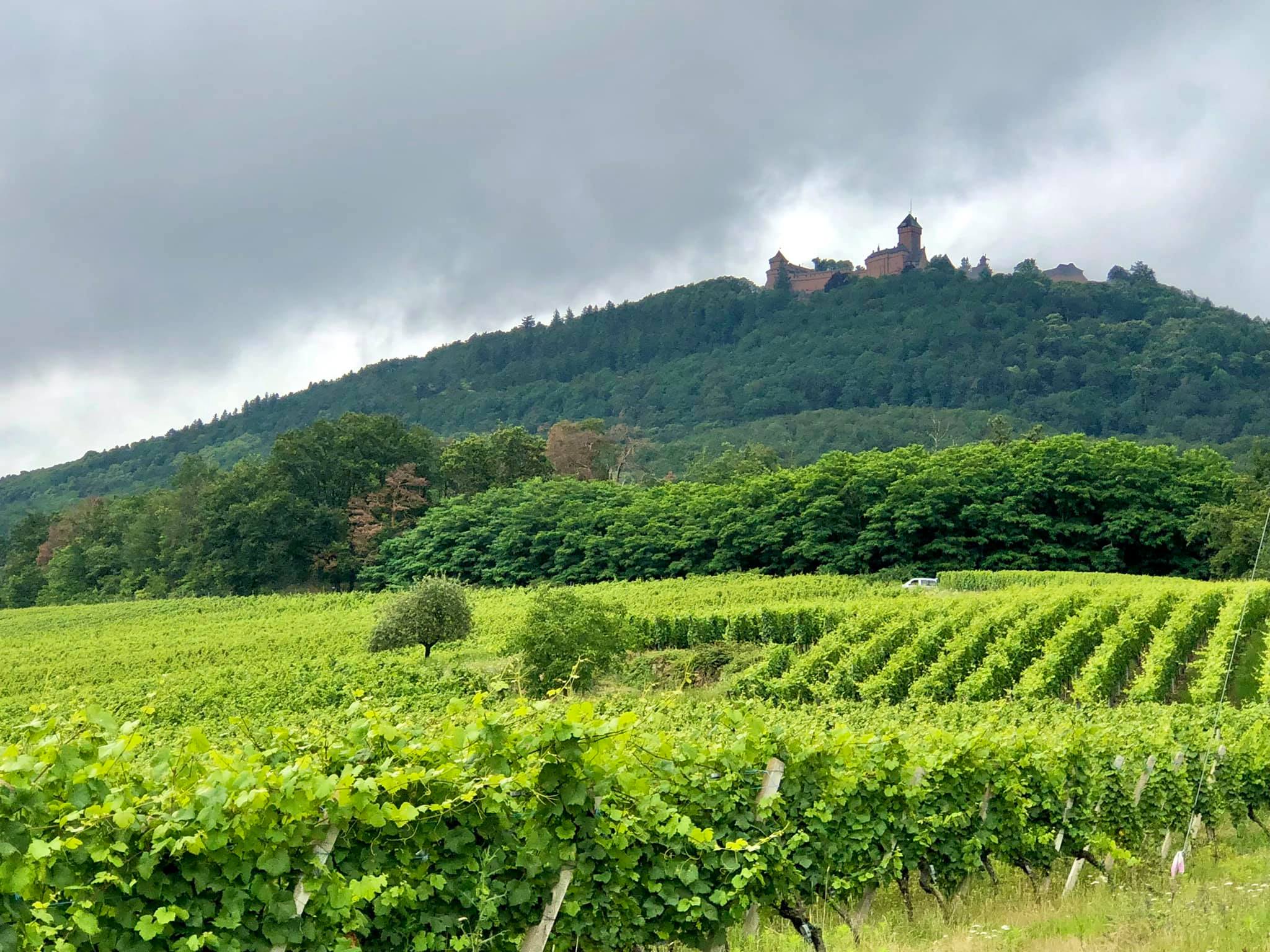
There are walking paths that circle the castle and take you through a thick forest. I actually prefer visiting the outside of castles more than the inside. It was well worth the trip to see this one. You can find more history and information about the castle on this website.
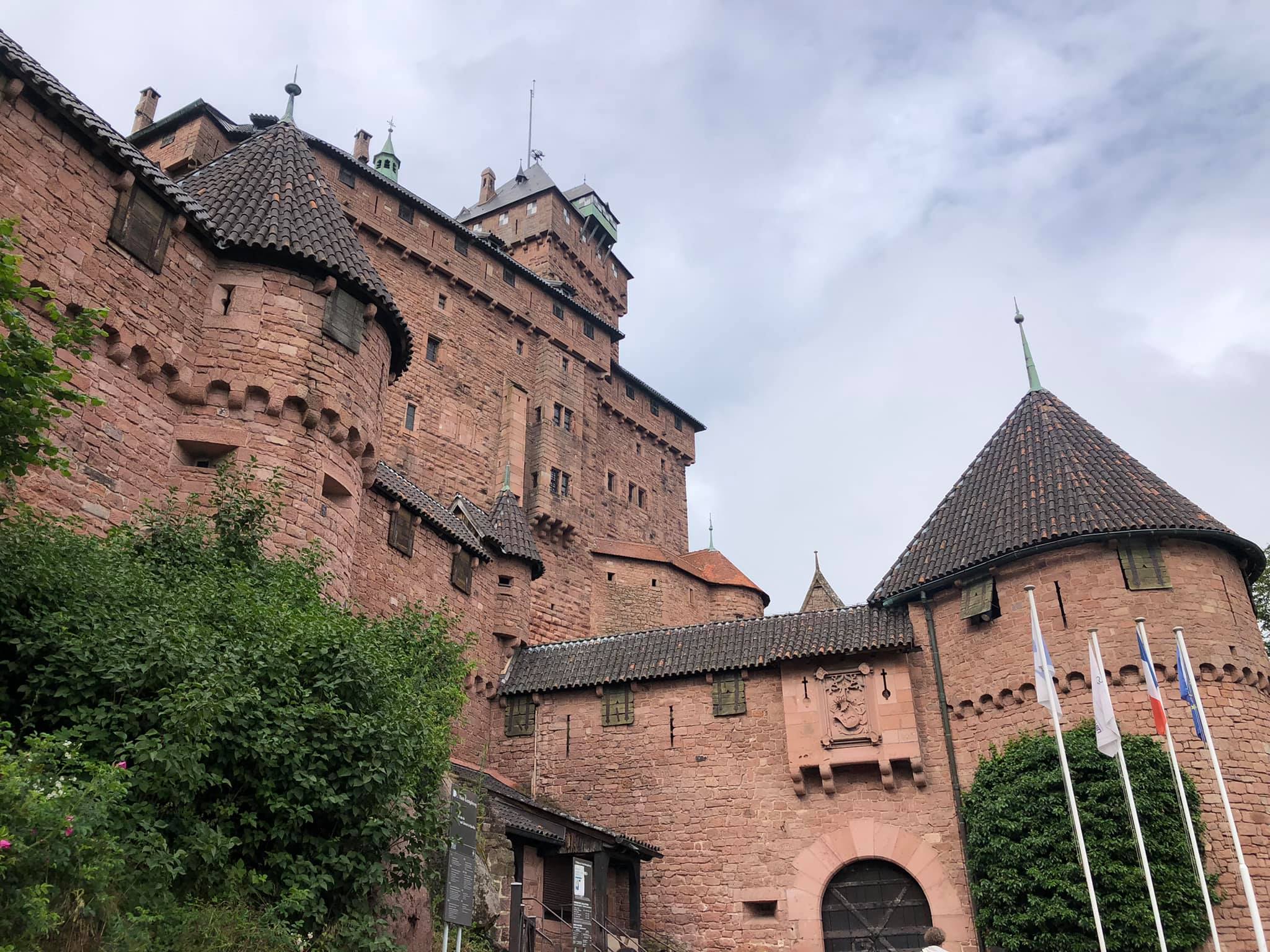
Strasbourg
Who goes to Alsace without including Strasbourg on the itinerary, right? I had been to this town once in 1993 and didn’t remember much about it, so we drove the one hour from Colmar to spend a couple of hours here. Strasbourg is the largest city and capital of Alsace.
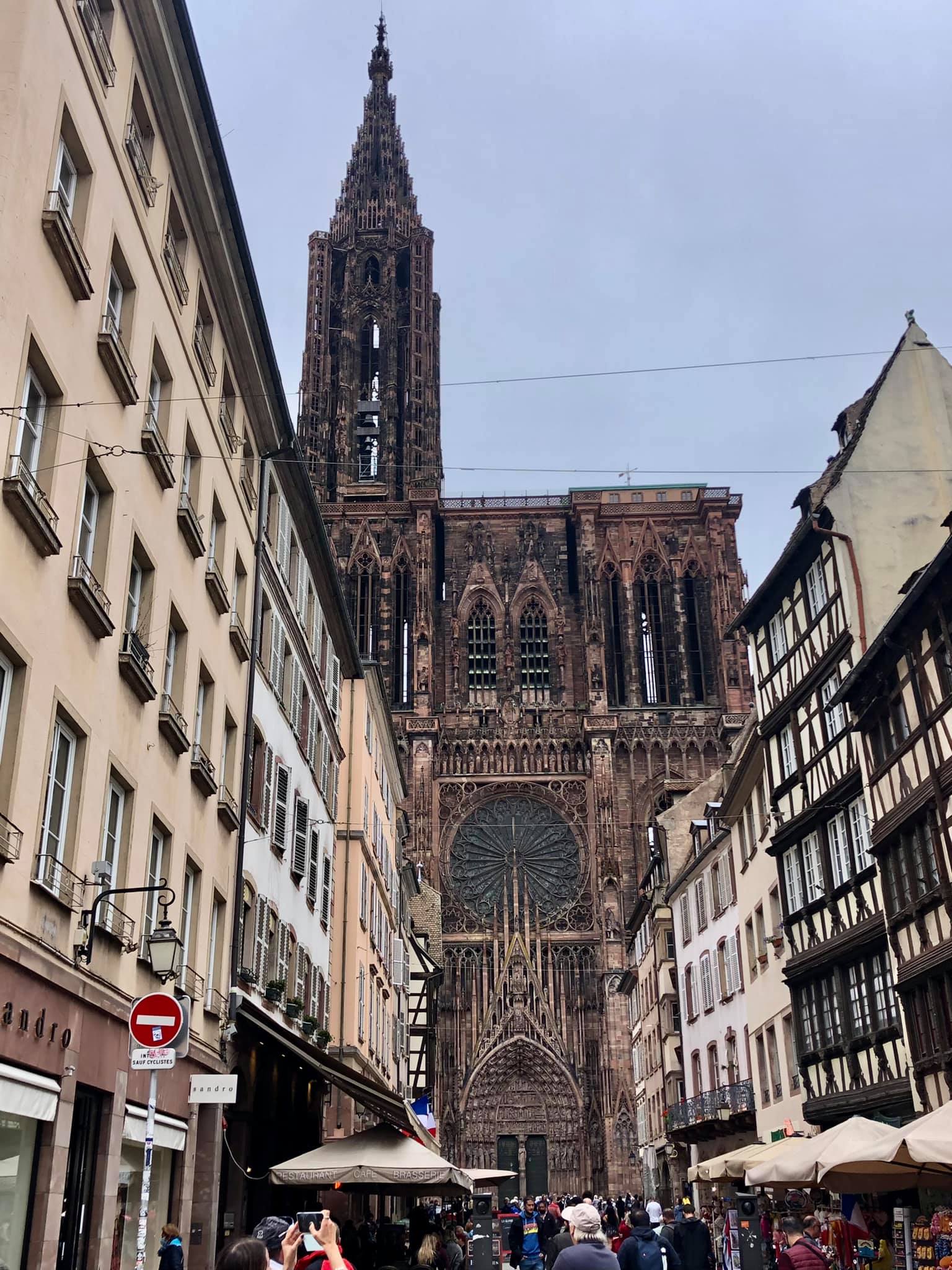
Our first stop in Strasbourg was the Cathedral in the center of town. It is called the ‘Cathedral of Our Lady of Strasbourg’ or the ‘Cathedral Notre Dame’. The construction was started in 1015 and completed in 1439. Entrance is free and this catholic cathedral is a must-see.
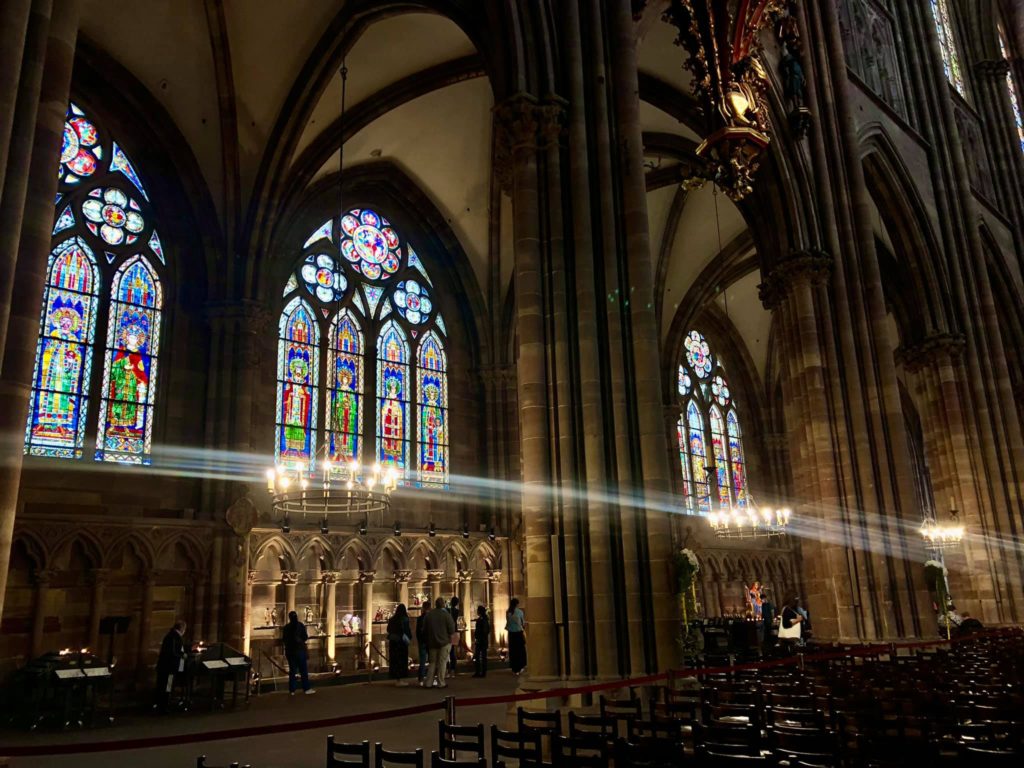
The stained-glass windows date from the 12th and 14th centuries. There is a Renaissance astronomical clock that was initially built in 1842. The architecture is Gothic and Romanesque. For more information about the cathedral, check out this website.
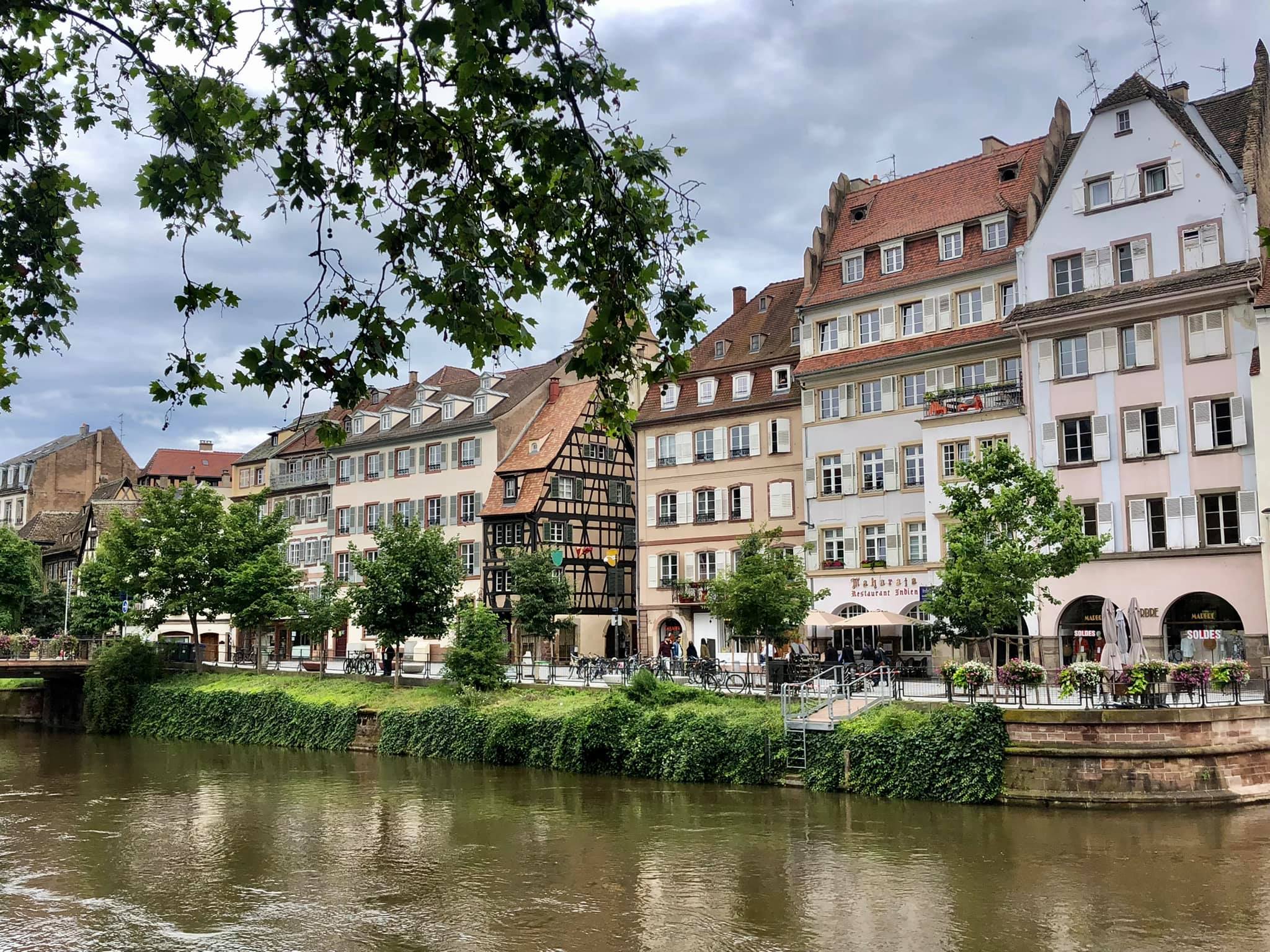
After the cathedral, we walked along the river to see the Petite France quarter and the old town of Strasbourg. It is located on Grand Ile and has been a UNESCO heritage site since 1988. This area was once used by tanners, millers, and fishermen.
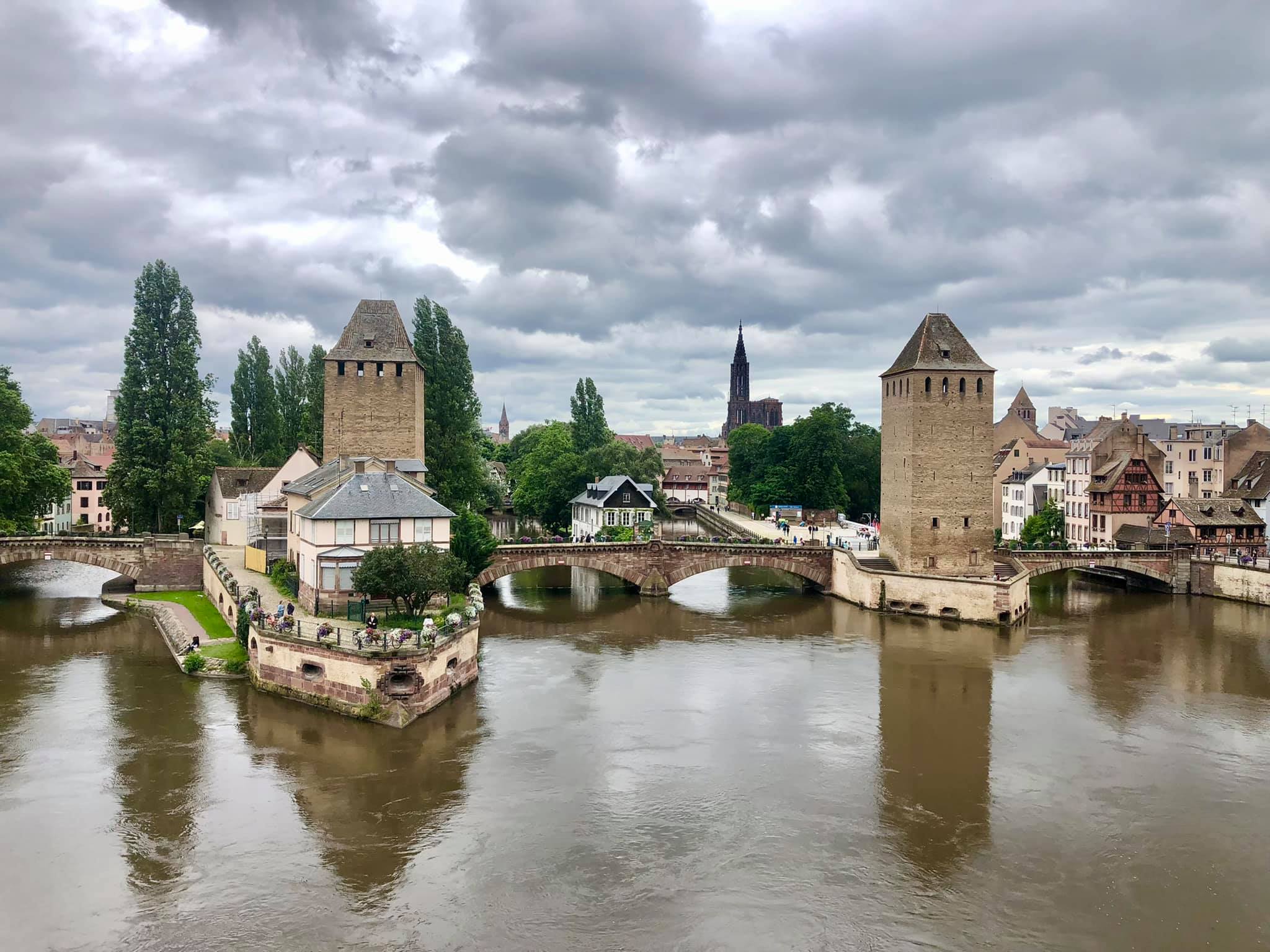
River III splits into four canals. We got a great view from the platform of the Vauban dam which was built in 1690.
I have to say I personally appreciated the smaller Alsace towns over the larger Strasbourg city. The main reason to go to Strasbourg is to see the amazing cathedral.
Eguisheim
Just when we thought we had seen enough Alsace medieval villages, we decided to stop by Eguisheim on our last day before heading back home. I’m glad we made this slight detour because this village was also one of our favorites.
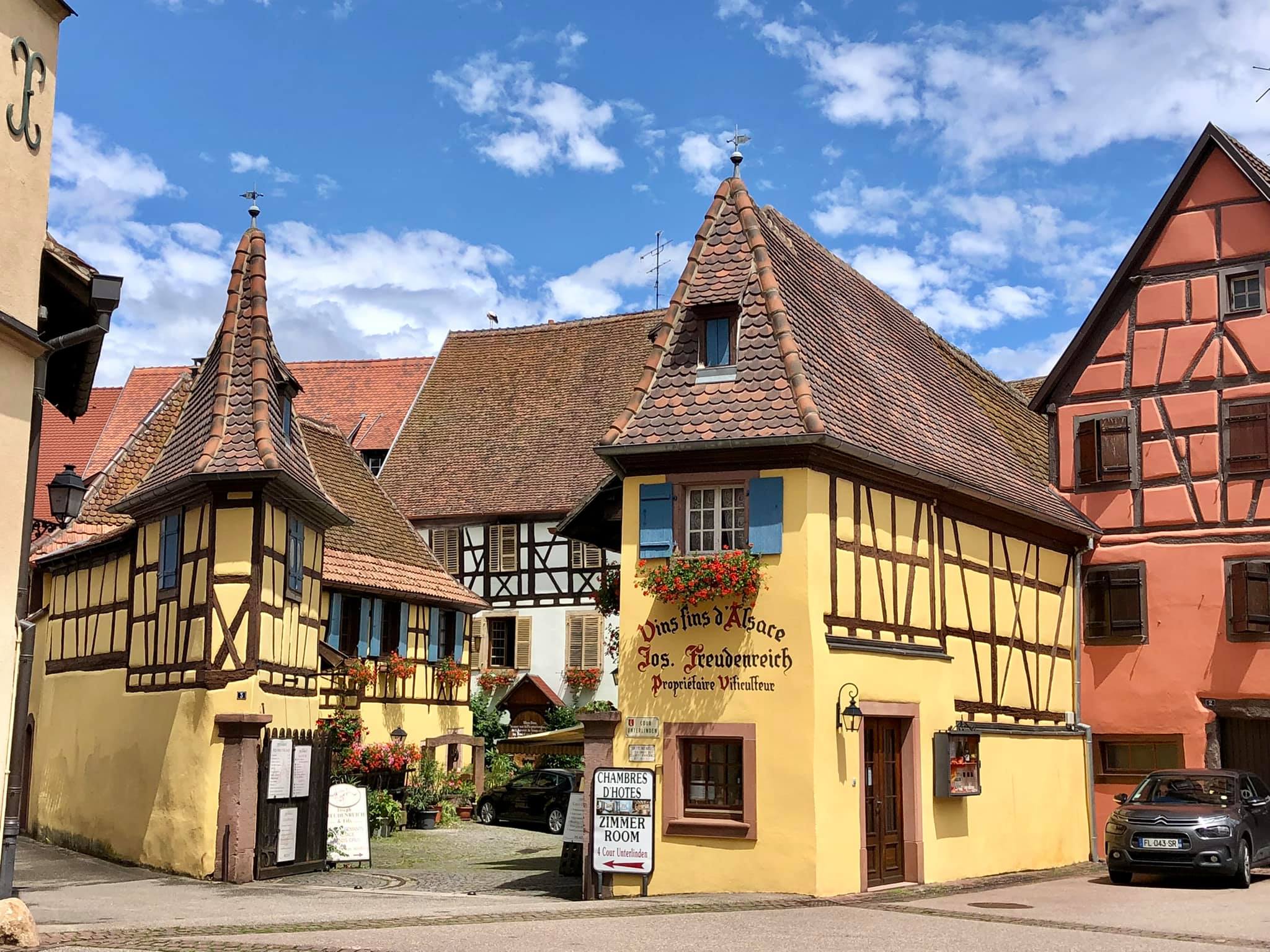
Eguisheim has been called “One of the Most Beautiful Villages in France”. It had circular streets around the center, all very narrow and cobblestone covered.
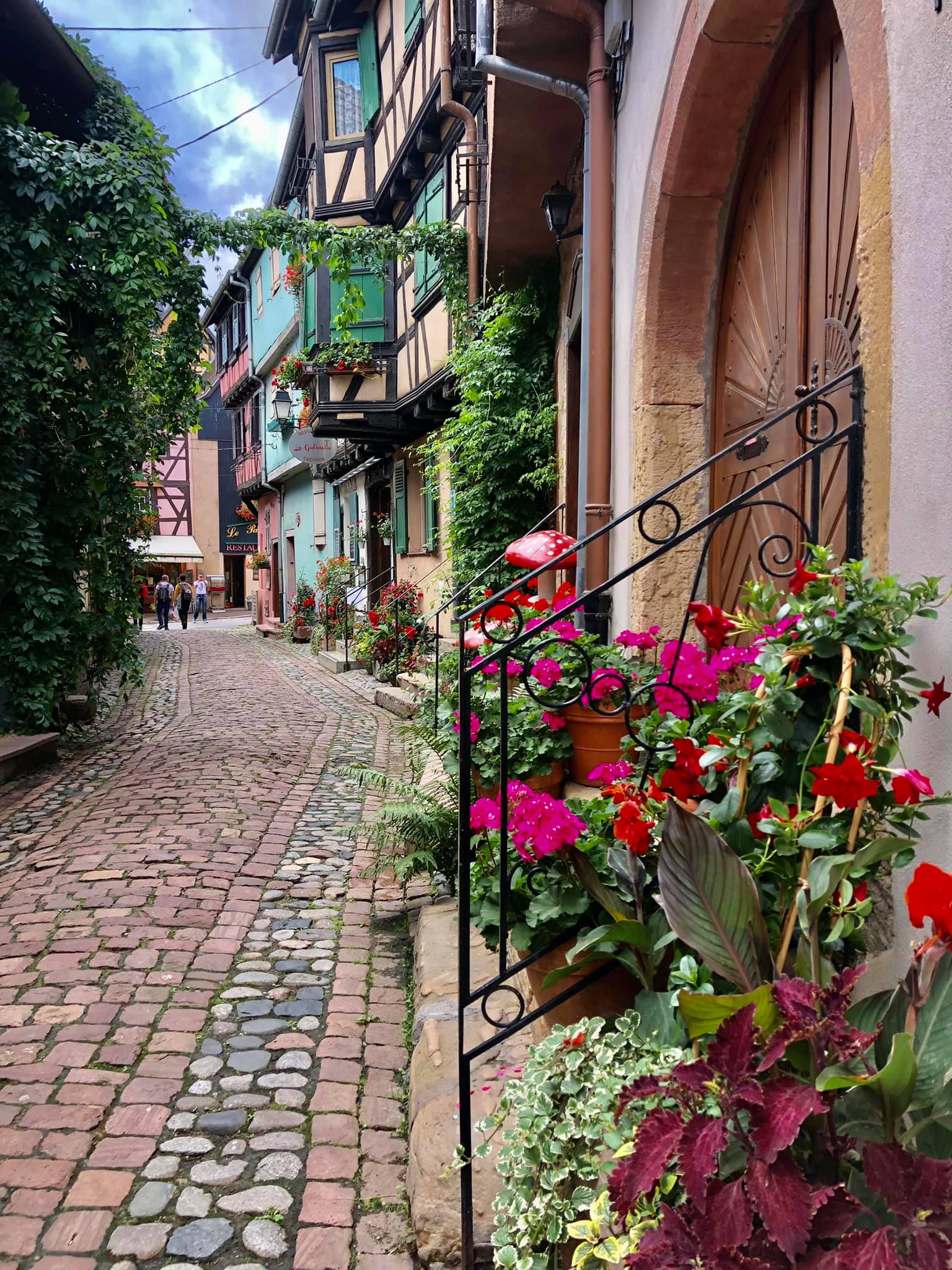
The streets were filled with colorful flowers and some of the windows were decorated with pots and pans. We saw lots of windows in Alsace that were decorated in a similar style.
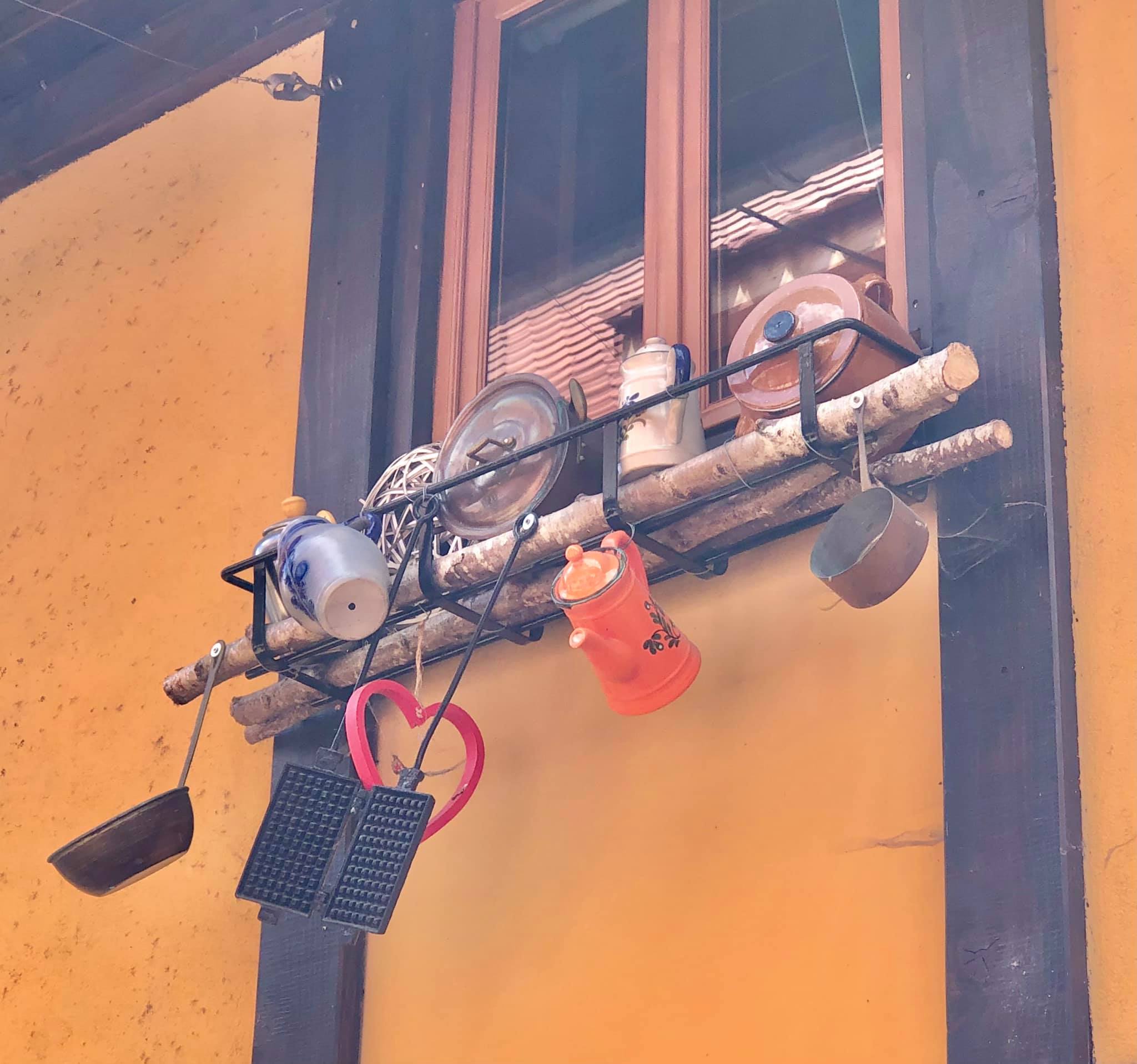
This town had many storks sitting up in the big nests on the church and buildings. We came to learn about storks in Alsace. This large white bird is the symbol of Alsace representing happiness and faithfulness.
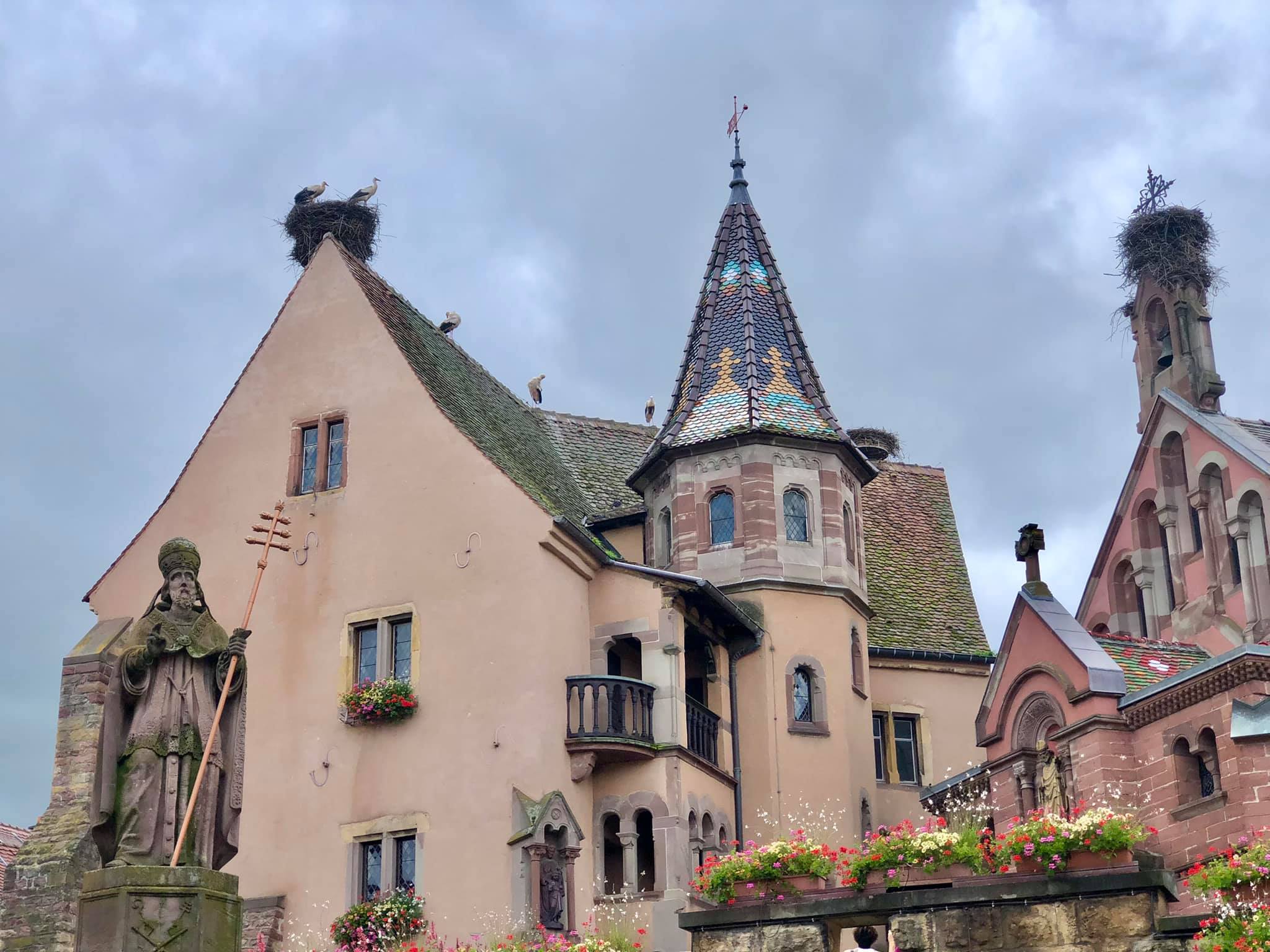
One reason why these birds have evolved here is because of the geography of Alsace and the abundant marshlands that made it a good feeding ground for storks. We were amazed to see these storks flying all around. You will find many stork souvenirs in all the shops!
Best Towns in Alsace – Summary
For the four days we stayed in this region, I believe we saw the best towns in Alsace! Of course, there are many more along the Wine Route that you could visit. I’ve circled in BLUE on the below map the towns we visited. Except for Strasbourg, they were all within a 30-minute drive from Colmar.
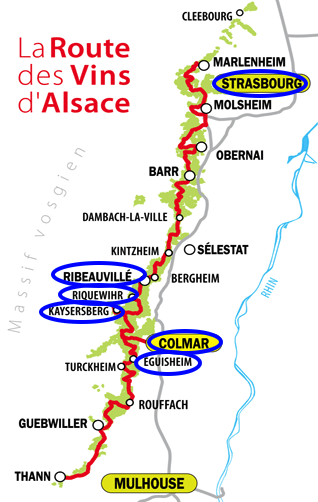
The Alsace landscape is clean and simply beautiful. Because it is relatively flat, I told myself it would be a nice area to do a bike tour. You could bike from town to town and stay in the different villages.
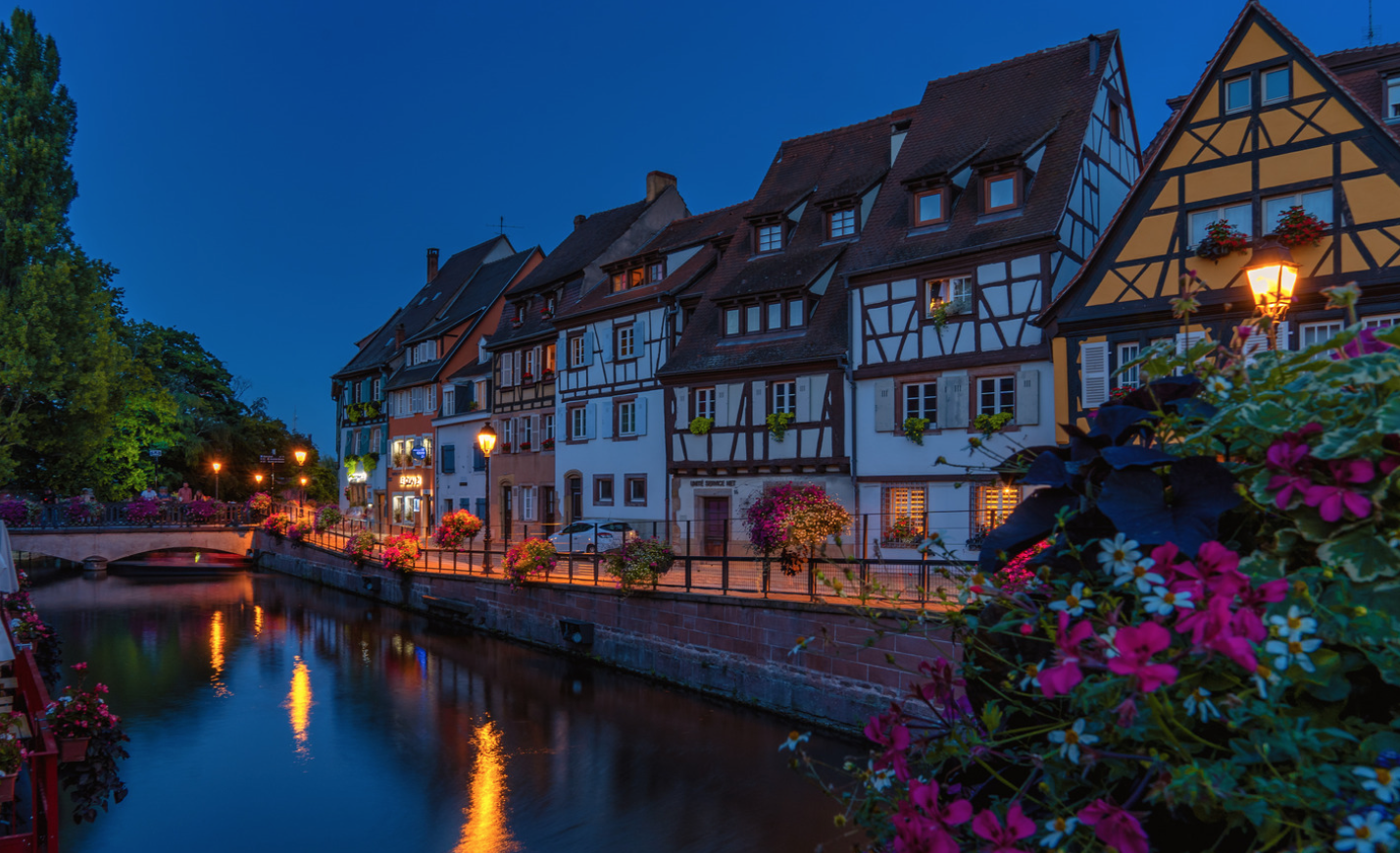
I would also like to see the Alsace area in Autumn with the colorful vineyards. Strasbourg and other towns are known for their elaborate Christmas markets. I hope to return one day to visit in a different season.
Click on the below image to save this post to your Pinterest for future reference!
If you are looking for assistance to plan your next trip, I am here for YOU! I love to plan travel itineraries for myself and others. For more details on how I provide this service, please check out my Itinerary Planning page and drop me a quick email at jan@janadventures.com to get started!


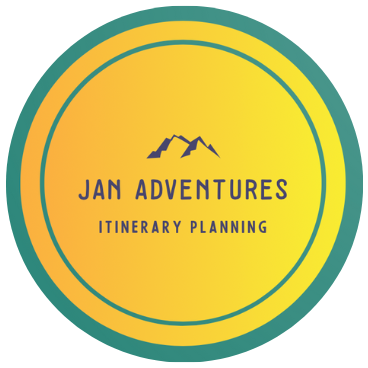
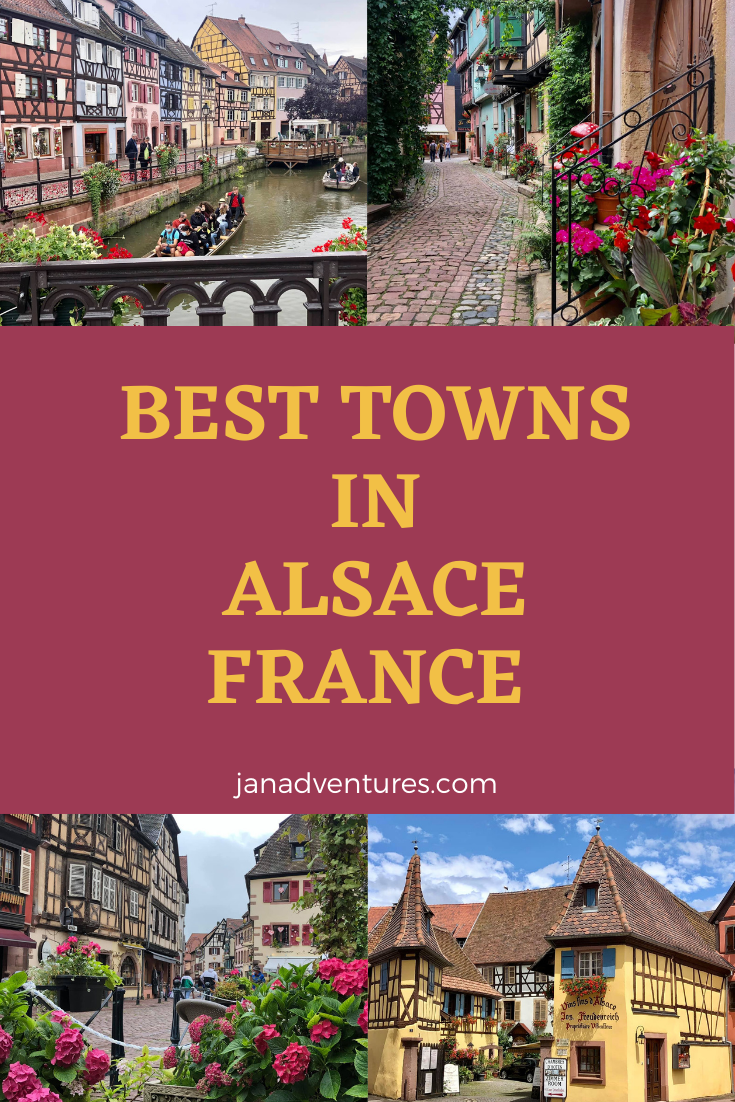
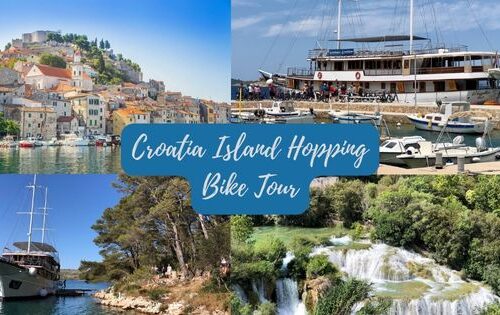
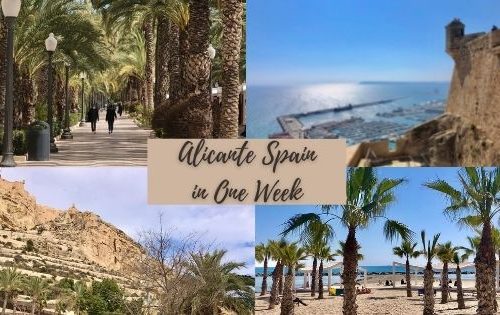

18 Comments
Cindy Moore
What a beautiful area in France! I love the houses and narrow streets.
Melissa Jones
That is a beautiful place and you have amazing pictures! I would love to see that in person!!!
Marianne
Your photos are amazing! The half timbered homes remind me of Germany! I would love to explore Alsace France!
Sabrina DeWalt
What a spectacular area. I hope to have the opportunity to visit one day.
simplyjolayne
Having visited a few of these towns, I can attest to their beauty. I would love to go back and wander through a few more that you listed.
Barbara
It looks very charming. I love quaint little historic towns. So much history and many stories of the people that made their lives and grew their families in these areas need to be shared! LOVE IT! Gorgeous!
Tiffany Smith
I would love to stop at some of these towns! And good to know about that lunch cut-off time…I will have to have snacks! LOL
Sandi Barrett
I have been to Strasbourg and it is so beautiful. Your photos capture the lovely ambiance.
Jan
Thanks Sandi!
Alice
Wow, I’m not familiar with much of France and dont know much about this area. The historic building are amazing! Thanks for the tour.
Debbie
What a charming area to explore. I love your pictures!
Jan
Thank you Debbie!
Amy Irvin
Beautiful pictures! This article could be published in a travel magazine! Thanks for sharing.
Jan
That is sweet of you to say! I wish I could write for a magazine!
Alicia
Wow! The Chateau Du Haut-Koenigsbourg has to go on my list of things I have to see! That looks insanely cool.
Alexis Farmer
Wow, that aerial view 😍 I would love to wander around Alsace.
Linda Winans Egeler
What enchanting towns to wander through! Looks like you picked a great home base. I may have to follow your itinerary one day!
Cindy
Gorgeous! That looks like an amazing trip.